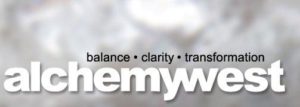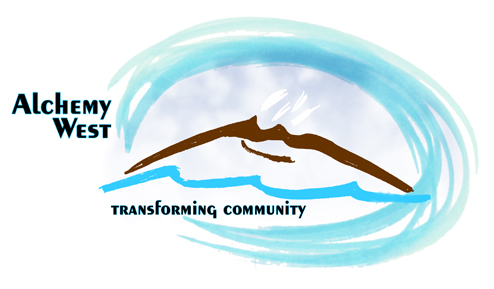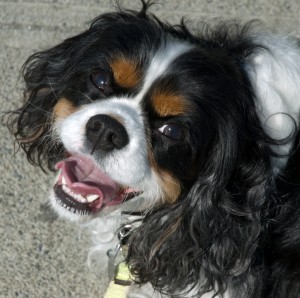 When my youngest dog, Alki, became deaf, I had to figure out how I could make him comfortable with his handicap. How to make us all comfortable: Alki, my nearly 10-year-old Cavalier; his 12-year-old Cavalier sister, Murphy; Grace the Cat; me; and friends, family, and visiting clients.
When my youngest dog, Alki, became deaf, I had to figure out how I could make him comfortable with his handicap. How to make us all comfortable: Alki, my nearly 10-year-old Cavalier; his 12-year-old Cavalier sister, Murphy; Grace the Cat; me; and friends, family, and visiting clients.
We’re familiar with handicaps at our house: of the four of us, only Grace the Cat is not dealing with some kind of disability (although, in the middle of the night, I sometimes think her touchy tummy qualifies).
The trick is to balance empathy and compassion, fairness and firmness, for all family members. Sure, the newly handicapped family member takes center stage. However, everyone is affected, so paying attention to everyone’s needs short-circuits jealousies and misunderstandings and provides space for healthy change for everyone.
My multi-species family did the practical things, as described in Part 1 of this article. It’s what we added to the mix that mattered: the socio-cultural things that define how we survive, and thrive, in adversity.
Alki becoming deaf was a shock. Yes, like all living beings, he’d had some problems, but as we dealt with Alki’s deafness I was surprised how it pushed my buttons. Somehow I relied on Alki to be the ‘easy’ one, because he was so sunny and sturdy, Murphy had so many health problems, Grace the Cat had a rough start, and I’ve been handicapped for too many years to count.
I knew better, but I still never expected things to change for Alki. Once I got used to his Velcro personality it stuck to me so well that the physical and emotional teamwork that developed feels as natural as breathing. I didn’t want it to change. Or end.
I loved having his constant attendance. He loved always being there. Now we both mourned the loss of his hearing and had to work our way through it to both honor and deepen our human-animal bond. Sure, we did the practical things, but we also did the cultural ones.
Six Socio-cultural Comforts
- Acceptance. I made it clear to Alki that his handicap didn’t change how I felt about him, only how we managed daily life. Then I proved it all day long.
- Grace and humor. Meet everything, obstacle or otherwise, with grace and humor. I repeat: grace and humor.
- Kindness and reassurance. Everybody has to adapt to a handicap. Alki and Murphy and Grace the Cat learned new ways of respecting and living with each other. So did I. Alki knows that I am physically handicapped and always in pain, and he worried about me having to get up and go to him. I simply made it clear that I would rather get up and walk to him than live without him.
- Compassion. Everyone needs compassion, not just the handicapped animal. Take time to love and accept each other. Make sure everybody gets it.
- Emotions. Put yourself in the animal’s place. How would you feel if you were suddenly handicapped? What would you need from your family? Act accordingly. Animals are emotional beings just as we are, so pay attention to their needs and concerns. So what could I do for Alki? This isn’t New Age pablum: a frightened, hurt animal can be dangerous, so you absolutely must know your animal’s personality. Is it shy, passive-aggressive, high strung, sensitive? Does the animal act as if it feels threatened or unsafe? Alki’s body language even at rest was clue enough: he was tense, on guard, curled in a scared tight ball. He was not himself. You see that a few times and you act. It’s dangerous and cruel to let unhappiness like that continue.
- Love love love. Never stop telling every multi-species family member, including the handicapped ones, that you love them, and never stop proving it. Dealing with a handicap is time-consuming, frustrating, and upsetting, but if life were perfect, wouldn’t you be bored? You can choose a throwaway culture and abandon a handicapped animal, or you can help everyone adapt and grow.
We adapted to Alki’s handicap. I sighed away the sadness when it rose. Things happen in life, and this happened to all of us.
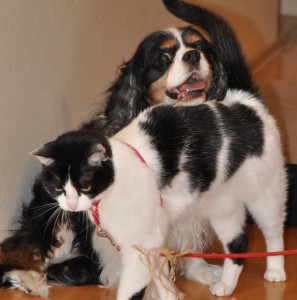 What really pained me was that Alki couldn’t fully adjust to his deafness. He adapted, but he was often uneasy, uncertain, and frightened. I knew I was missing something, but what?
What really pained me was that Alki couldn’t fully adjust to his deafness. He adapted, but he was often uneasy, uncertain, and frightened. I knew I was missing something, but what?
The breakthrough was as ordinary as everyday life.
In our daily family rituals I have one-on-one morning and evening times with each animal. One night, I spent a long session with Alki. I hugged and petted him, and made sure he was looking at me as I told him how much I loved and respected him, that he would always be family, that we would deal with his deafness as best we could. That he was my son, we were family, and his deafness didn’t matter.
I assured him, over and over, that the only thing that changed was his ability to hear. Then I intuitively talked with him, showing him that we could still communicate even if he couldn’t hear me speak out loud. I gave him a long massage, something he loves. And I used a form of energy work, which I call dimensional healing, that arrived in our household about five years ago after I specifically asked for a form of energy that would work for my multi-species family.
That night I made my love and acceptance visible to Alki. He gradually relaxed. I felt better. Murphy and Grace the Cat fell asleep. I went for a drink of water and when I came back Alki was in an excited crouch on the bed. As our eyes met his sparkled and he thumped his tail hard, excited. The sad, perplexed dog was gone, and my beloved Alki was back. Breakthrough! Yes, a long time coming, but it did come!
Alki made huge progress after that—sure, he still needed extra care, but his sunny, optimistic, adventurous personality returned. He finally understood that, no matter what, he is my son and an equal family member, and that trumps everything.
Alki was deaf, yes, but he could hear what mattered—that he was loved and accepted. Then came the day when he proved that he could take that understanding back out into community.
We were out alone together, a block from home, when a stray dog ran up to us. Now Alki had been uncertain with dogs since his mauling and the deafness, so I fended the other dog off, while thinking it might be one of the dogs in our neighborhood.
I was surprised that Alki stood quietly beside me, instead of barking or shying away. The dog moved a few feet away and stopped to stare at us. We stared back. Alki and I exchanged a long look, then he visibly braced himself, just like humans do when we suck up uncertainty and move on. Calmly stepping toward the dog, Alki cocked his head at it, clearly inviting it to join us.
The three of us slowly made it down the street. Each time the dog started to wander off, I’d call it or Alki would turn and cock his head, and the dog would follow us. Eventually the dog and its people were reunited.
By the time we got in our own door that day I was bursting with proud mama-ness. I hugged and praised Alki for his kindness and bravery. He had not only faced his fear but put it aside to help another dog get home again. He had learned to live with a disability and go back out into community.
Alki has been fine ever since. Deaf, yes. Reassured by his family’s love, adjusting to changed circumstances, yes, my boy is home. It’s not the same home it was before he became deaf: somehow, it’s better.
Why? Because on the deepest level that counts Alki can hear again. Deafness is a condition, a handicap, yes, but it’s also a choice. Do we withdraw, do we hide, or do we adjust and find a new pattern to life? Like all things in life, we choose fear or we choose love.
 We were afraid for awhile, but ultimately we chose love in our multi-species family. Alki chose love.
We were afraid for awhile, but ultimately we chose love in our multi-species family. Alki chose love.
Love is what made my deaf dog hear again. Love and what comes with love: patience, grumpiness, acceptance, compassion, hard work, common sense, frustration, grief, and an adventurous open spirit that may stagger but never gives up.
The mindset that comes from love is what we use to nurture our families, multi-species or not, in the traumas and triumphs of daily life. It’s what we use to create communities where we learn and grow from our difficulties and celebrate our triumphs. With animals we call it the human-animal bond; in truth, it’s community.
Love helped Alki adapt. It didn’t make it easier, but it did make it bearable. He’s still my little boy who shouldn’t suffer, whose sunny disposition should be rewarded by endless health and youth. Bodies fade, but love doesn’t give up for anything.
Love did it.
Love made my deaf dog hear again.
(c) 2011 by Robyn M Fritz
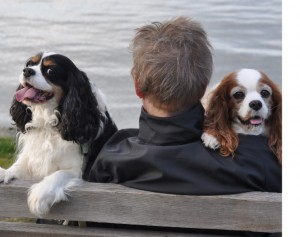 Survival of the fittest isn’t what you think it is. It depends on who you are and what you’re up to.
Survival of the fittest isn’t what you think it is. It depends on who you are and what you’re up to. My son is deaf. My youngest dog, my Velcro boy, my goofy sweet Alki, is stone cold deaf.
My son is deaf. My youngest dog, my Velcro boy, my goofy sweet Alki, is stone cold deaf.
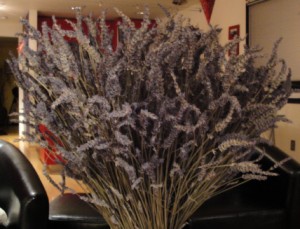 It’s been a strange summer in Seattle, in fact, two stranger summers in a row. Cooler than normal, and damp when it’s usually dry.
It’s been a strange summer in Seattle, in fact, two stranger summers in a row. Cooler than normal, and damp when it’s usually dry.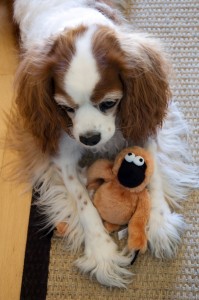 My eldest dog, Murphy, a female Cavalier King Charles Spaniel, is 13. We never expected her to make it to 3, but she’s vibrant and healthy.
My eldest dog, Murphy, a female Cavalier King Charles Spaniel, is 13. We never expected her to make it to 3, but she’s vibrant and healthy. It was a summer evening and the dogs and I were out for last call. A man and woman at the end of the block were standing next to the waist-high wall that bordered my neighbor’s steep property.
It was a summer evening and the dogs and I were out for last call. A man and woman at the end of the block were standing next to the waist-high wall that bordered my neighbor’s steep property. Yesterday I took the afternoon off to have some fun. I loaded up on tasty candy at my local food co-op and headed off to see Cowboys & Aliens with a new friend. Sure, Wall Street was acting up big time (again, and pointlessly, really, how should we handle a spoiled brat?), but I had time off! What could be as cool as that?
Yesterday I took the afternoon off to have some fun. I loaded up on tasty candy at my local food co-op and headed off to see Cowboys & Aliens with a new friend. Sure, Wall Street was acting up big time (again, and pointlessly, really, how should we handle a spoiled brat?), but I had time off! What could be as cool as that? Sure, I love my Canon printers. Even the non-techies among us can use them, and if you can’t, they have excellent customer support. I should know: this summer the kind folks at Canon have had to help me install my printer drivers for two printers on three different occasions, as I dealt with computer issues.
Sure, I love my Canon printers. Even the non-techies among us can use them, and if you can’t, they have excellent customer support. I should know: this summer the kind folks at Canon have had to help me install my printer drivers for two printers on three different occasions, as I dealt with computer issues.

